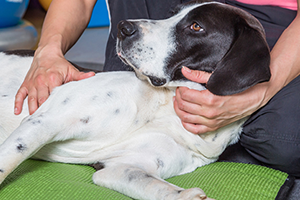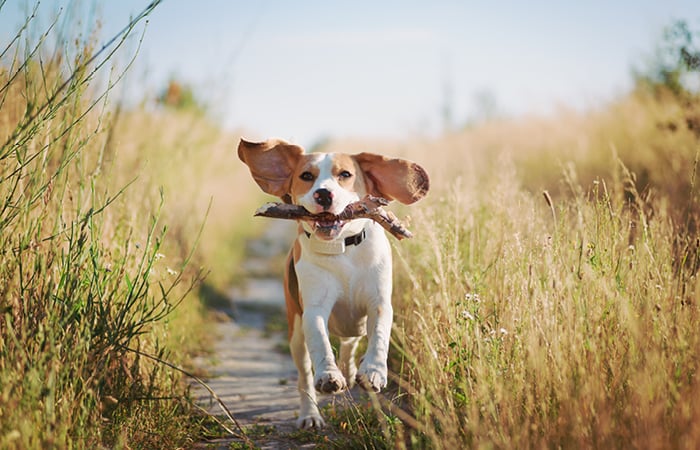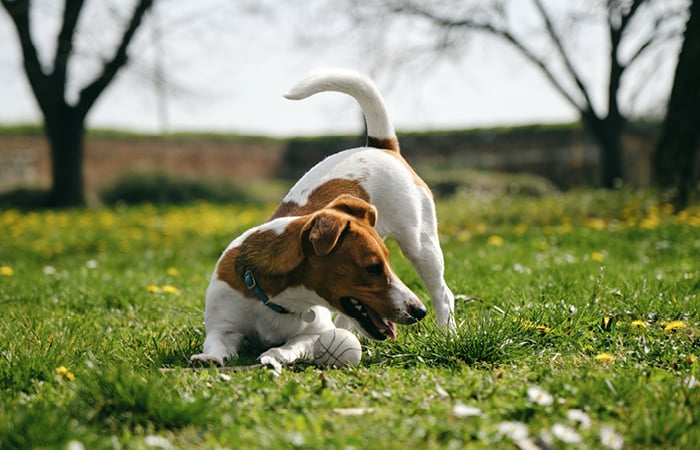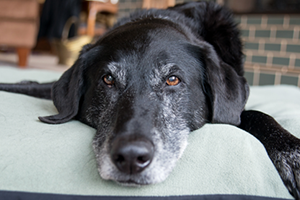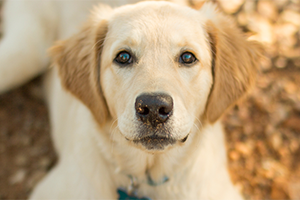
A loyal and protective companion who loves spending time with their owner
Vital stats
Swipe to view more
| Size: | Large |
| Coat: | Short and smooth |
| Exercise | 2+ hours a day |
| Life span: | 9 – 13 years |
| Breed group: | Working |
| Temperament: | Loyal, alert, protective, obedient |
Dobermann temperament & personality

- Extremely loyal dogs, Dobermanns tend to form very strong bonds with their owners. In the right hands, and with time invested in their training and exercise, a Dobermann will be a devoted and affectionate companion and a much-loved member of a family unit.
- Because of their specific needs and intensive training and exercise requirements, Dobermanns are best suited to experienced dog owners rather than first timers.
- Their protective instinct and alert nature means Dobermanns can sometimes be wary of strangers, but they are generally friendly towards new people especially if introduced by their owner. They are often very protective of children too.
- Dobermanns craves companionship and tend to build very strong bonds with an owner. This can mean they become quite clingy and suffer from separation anxiety if left on their own for long periods of time.
- A strong prey drive means that caution should be exercised around wildlife and livestock as they have a tendency to chase small animals whenever the chance arises.
Dobermann training & exercise

Training tips
- Training a Dobermann is an ongoing and daily task and should be consistent throughout their lives. Prospective owners should be prepared to spend the time on both the training as well as the exercise a Dobermann needs.
- As a highly intelligent and instinctively obedient breed, a Dobermann will respond well to training. But this should start at an early age to set the boundaries, determine the owner as pack leader and avoid any unruly behaviour further down the line.
- Because their loyal nature can make them defensive around strangers, it’s important to prioritise socialisation when training a Dobermann. Puppies should be introduced to new people, places and experiences early so they become familiar with sights, sounds and smells.
- A Dobermann will respond to firm but fair training methods. While owners should use consistent and clear leadership, they should never treat their pet harshly but always with respect. By doing so, a Dobermann will become an extremely obedient and loyal companion.
Exercise
- As large, athletic dogs, Dobermanns need lots of exercise and owners should expect to spend at least 2 hours a day making sure their pet gets the right amount of physical and mental stimulation. Without adequate exercise, a Dobermann can become noisy or destructive around the home.
- Dobermanns are a good choice for owners with active, outdoor lifestyles as they love nothing more than long walks and running off the lead. Jogging with a Dobermann can be a fun way to keep both dog and owner fit and healthy, but avoid doing so before a dog is 18 months old.
Keeping them happy
- Apart from making sure they get the right amount of exercise and mental stimulation, as well as the consistent training they need, a Dobermanns will just love spending time with its owner. Keep them involved with household activities and they’ll be very happy. But don’t leave them on their own for too long or separation anxiety could set in.
Game ideas
- As well as long walks and lots of running, Dobermanns also enjoy more challenging activities such as canine sports. They often excel at agility courses and will love a game of Flyball – a competitive canine relay that involves teams of dogs collecting balls from a Flyball box at the end of a track.
- A strong prey drive means that Dobermanns love chasing and retrieving. As well as chasing a ball on the beach, try a game of Frisbee.
- Swimming can be a great way of giving your pet a good workout without putting too much stress on their joints or bones. Dobermanns tend to enjoy getting in the water for a splash around.
- A Dobermann’s ability to learn and their receptiveness to commands mean they are ideal candidates for obedience training. Start with basic commands such as ‘stay’ or ‘sit’ before moving on to more difficult tasks. Use positive reinforcement and a tasty treat to reward a job well done.
Common Dobermann health conditions

Dobermann grooming

- There are four recognised colour varieties of Dobermann: black, brown, blue or fawn with rust red markings.
- Their short, smooth coats need brushing only once a week to keep it in good condition. Using rubber grooming mitts will help to remove dead hair more easily.
- As with most other breeds, Dobermanns tend to shed more during the spring and autumn so more brushing will be needed at these times.
- Good dental hygiene should include regular brushing with a vet-approved toothpaste and ears should be checked regularly for infection caused by excess wax.
- Dobermanns have a long tails and large, floppy ears but they can sometimes undergo cosmetic surgery to dock their tails or crop their ears to make them more pointed and erect. Not only is this unnecessary, ear cropping is illegal in England and Wales under Section 5 of the Animal Welfare Act 2006.
Dobermann nutrition

As large, energetic dogs, Dobermanns have appetites to match. But it’s important to keep their diet balanced and consistent to avoid bloating, obesity and inappropriate growth rates in pups. Talk to your vet about the right diet plan for your dog.
- Dobermanns are large dogs and need the right balance of energy, protein and minerals to ensure healthy joint development. Too much of these nutrients can be as harmful as too little.
- Always maintain a consistent diet and feeding routine. If you need to change it then do so only gradually to avoid tummy upsets, particularly in puppies.
- As a deep-chested dog, a Dobermann can be prone to bloating. It is therefore best to avoid feeding immediately before or after exercise.
What to know before you buy or rehome a Dobermann

Thinking about offering a Dobermann a home? Before you buy or adopt a Dobermann, here are a few crucial things to take into consideration.
- As large, active dogs, a Dobermann needs lots of exercise – at least 2 hours each day. They also need lots of ongoing training and should be well-socialised as puppies.
- Dobermanns are best suited to experienced owners who can invest the time their pet needs. They will fit in well with active families with lots of space for them to burn off excess energy.
- Loyal, obedient and protective, a Dobermann can be a very loving companion for any owner. However, because they love human company so much they shouldn’t be left alone for long periods of time.
- Although they are a not a hypoallergenic breed, Dobermanns are low maintenance in terms of grooming.
- It’s important to get your Dobermann puppy from a reputable breeder. This will allow you to check the welfare of the puppies and meet the puppy’s mum to see if she has the temperament you’re looking for. ‘Lucy’s Law’ dictates that new puppies must be bought directly from a breeder or adopted from rescue. Third party sellers are now illegal.
- There are many things to consider before getting a dog. Always find out whether a canine friend is the best pet for you before you make the leap from dog lover to dog owner.
Dobermann frequently asked questions
Discover some of the most popular dog breeds
Dobermann insurance considerations
We always offer these things as standard:
Physiotherapy & pet therapies
Along with physiotherapy, which is covered within the Vet Bills benefit, we also cover Pet Therapies like herbal medicine, homeopathy and acupuncture. You can also claim for hydrotherapy, up to £500 per illness/injury in dogs and cats (no additional limit for rabbits).
Petplan is a trading name of Pet Plan Limited (Registered in England No. 1282939) and Allianz Insurance plc (Registered in England No. 84638), Registered office: 57 Ladymead, Guildford, Surrey GU1 1DB.
Pet Plan Limited is authorised and regulated by the Financial Conduct Authority. Financial Services Register No. 311969. Allianz Insurance plc is authorised by the Prudential Regulation Authority and regulated by the Financial Conduct Authority and the Prudential Regulation Authority. Financial Services Register No. 121849. Pet Plan Limited is a subsidiary of Allianz Insurance plc.




































